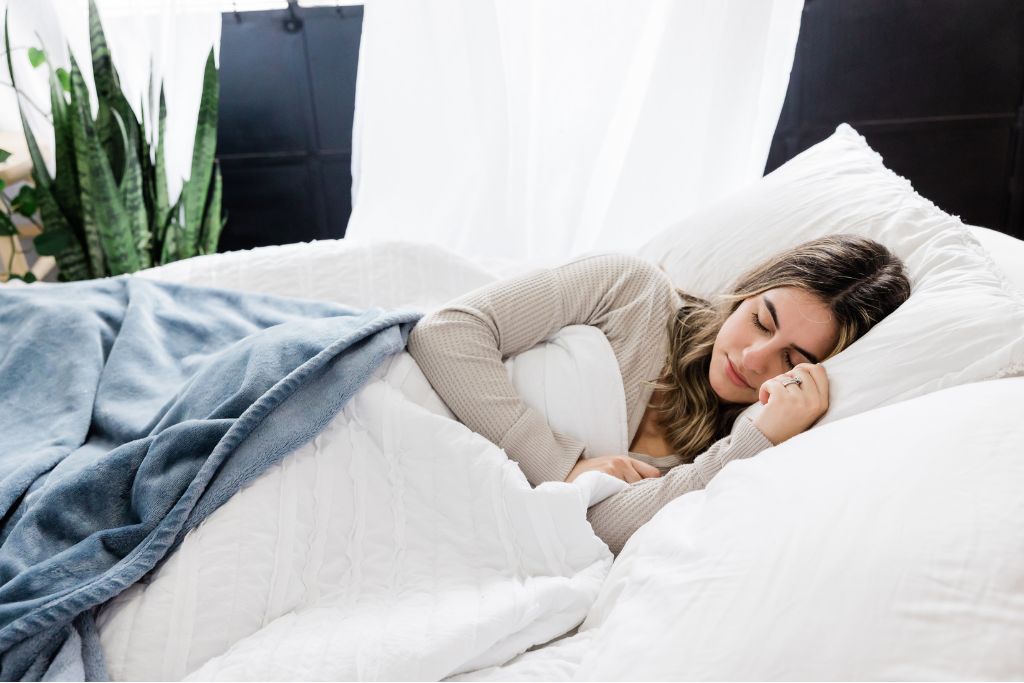
Does your snoring raise the roof? Sound like a freight train? Or is it loud enough to wake the dead? Perhaps it’s your beloved bed partner, not you, sawing logs all night. Either way, snoring is not merely a night-time nuisance, or the source of merriment among friends. Snoring is a health threat.
Snoring not only increases your risk of stroke, it may be the cause of chronic daily headaches, and it’s associated with Type 2 diabetes. It definitely affects sleep quality, leading to daytime fatigue, poor concentration, and irritability. Additionally, while not everyone who snores suffers from sleep apnoea, the majority of people with sleep apnoea also snore.
The good news? There are safe, natural remedies for snoring that can make a real difference. Here are five tips to help you stop snoring naturally.
Snoring is caused by big breathing or rather ‘over-breathing’. The sound of snoring is created when a large volume of air travels through a narrow space (your upper airway) causing vibrations in the tissues of the nose and throat.
If your breathing is soft and gentle, the air will quietly descend towards your lungs, eliminating the vibrations that cause the night-time noise.
Some people turn to anti snoring devices such as nasal dilators or mouth guards. These can help in the short term, but they don’t address the root problem: mouth breathing snoring. When you retrain your body to breathe through the nose, the vibrations reduce and sleep becomes much quieter.
The Buteyko Breathing technique helps retrain your breathing to be gentle and quiet, day and night. By shifting from mouth breathing to nasal breathing and reducing the habit of “over-breathing”, Buteyko can reduce snoring, improve oxygen uptake, and help you feel more rested in the morning.
Learn more about breathing retraining with Buteyko here.
Your tongue should naturally rest at the roof of your mouth, just behind the front teeth. This is the tongue’s “happy spot”. However, when your tongue is lying on the bottom of your mouth, particularly in sleep, it may partially block the airway, increasing the chances of snoring and sleep apnoea.
As you are not in conscious control during sleep, it’s important to train your tongue position during the day. Practice placing your tongue on its happy spot whenever you think of it, and especially as you are drifting off to sleep. Practice makes permanent.
Some people also benefit from sleep tape, such as Myotape, which gently encourages nasal breathing and helps reinforce correct tongue posture overnight. Many report that this simple change reduces snoring and improves the quality of their sleep.
There is a strong link between a blocked nose and snoring. If membranes lining the nose are inflamed and swollen, the passage to the airways becomes narrow, increasing air pressure and vibration of the upper airways. The result? Snoring.
What you can do:
Chronic nasal congestion is one of the most overlooked causes of snoring. Treating the nose, not just the throat, can make a huge difference.
For more guidance, read my naturopathic recommendations for sinusitis and blocked noses.
Very often, people can pinpoint the time they started snoring to when they put on weight. There is a strong link between neck circumference and increased risk of snoring and sleep apnoea.
If your neck is bigger than 43.2 cm (17”) for men, and 40.6 cm (16”) for women, you have a greater chance of snoring. Again, it’s the issue with the enlarged tissue reducing the size of the airway.
Don’t start swinging a hula hoop around your throat! it’s impossible to spot reduce whether tummy, thighs or neck. Losing weight overall will reduce weight around your neck and tongue too.
A sustainable approach is best: eating more whole foods, reducing refined starches, and supporting your body with gentle exercise.
You can also explore my Low Starch Eating Plan for healthy, sustainable results. Or book a naturopathic appointment if losing weight is a challenge for you.
Do you sleep on your tummy, back or side? Snoring, and sleep apnoea, are usually worse when people sleep on their backs. Sleeping on your back makes it easier for the tongue to fall backwards, partially closing the upper airways.
Sleeping on your side is best if you want to stop snoring naturally.
Tips for side sleeping:
Training your body to prefer side sleeping takes time, but it often pays off with quieter nights.
Learn more about Buteyko Breathing and how it can help you stop snoring.
Sometimes snoring is just noisy. But in other cases, it may be a red flag for obstructive sleep apnoea (OSA), a condition where breathing actually stops for periods of time during the night.
Signs to look out for include:
If these sound familiar, it’s important to talk with your GP or a sleep specialist.
For a deeper explanation, read our snoring vs sleep apnoea full guide
There’s no one-size-fits-all solution when it comes to snoring. The good news is, you’ve got options:
The path to peaceful sleep starts with the way you breathe!
Inefficient breathing (chronic over-breathing) is often the missing foundational habit that drives systemic stress, poor sleep, and anxiety.
Learn how to quickly normalise your breathing volume to calm your nervous system and improve your overall systemic health.